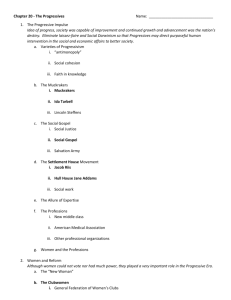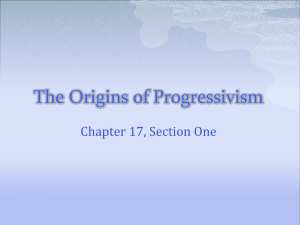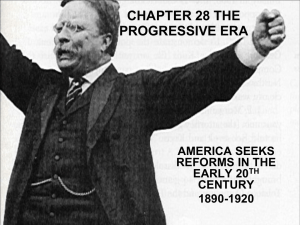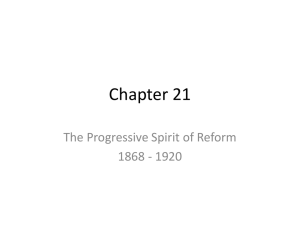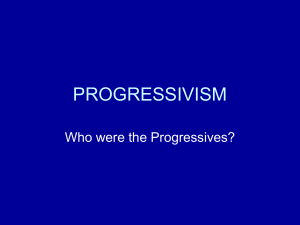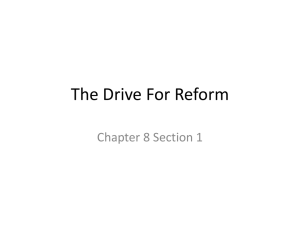Progressivism and World War I - LBCC e
advertisement
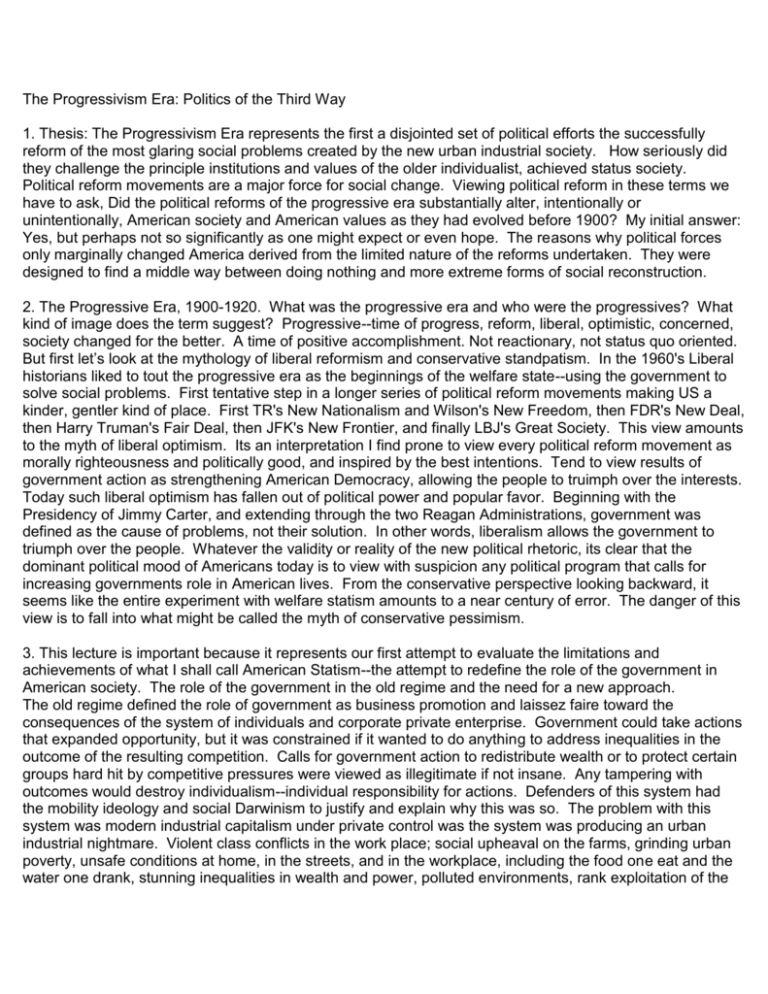
The Progressivism Era: Politics of the Third Way 1. Thesis: The Progressivism Era represents the first a disjointed set of political efforts the successfully reform of the most glaring social problems created by the new urban industrial society. How seriously did they challenge the principle institutions and values of the older individualist, achieved status society. Political reform movements are a major force for social change. Viewing political reform in these terms we have to ask, Did the political reforms of the progressive era substantially alter, intentionally or unintentionally, American society and American values as they had evolved before 1900? My initial answer: Yes, but perhaps not so significantly as one might expect or even hope. The reasons why political forces only marginally changed America derived from the limited nature of the reforms undertaken. They were designed to find a middle way between doing nothing and more extreme forms of social reconstruction. 2. The Progressive Era, 1900-1920. What was the progressive era and who were the progressives? What kind of image does the term suggest? Progressive--time of progress, reform, liberal, optimistic, concerned, society changed for the better. A time of positive accomplishment. Not reactionary, not status quo oriented. But first let’s look at the mythology of liberal reformism and conservative standpatism. In the 1960's Liberal historians liked to tout the progressive era as the beginnings of the welfare state--using the government to solve social problems. First tentative step in a longer series of political reform movements making US a kinder, gentler kind of place. First TR's New Nationalism and Wilson's New Freedom, then FDR's New Deal, then Harry Truman's Fair Deal, then JFK's New Frontier, and finally LBJ's Great Society. This view amounts to the myth of liberal optimism. Its an interpretation I find prone to view every political reform movement as morally righteousness and politically good, and inspired by the best intentions. Tend to view results of government action as strengthening American Democracy, allowing the people to truimph over the interests. Today such liberal optimism has fallen out of political power and popular favor. Beginning with the Presidency of Jimmy Carter, and extending through the two Reagan Administrations, government was defined as the cause of problems, not their solution. In other words, liberalism allows the government to triumph over the people. Whatever the validity or reality of the new political rhetoric, its clear that the dominant political mood of Americans today is to view with suspicion any political program that calls for increasing governments role in American lives. From the conservative perspective looking backward, it seems like the entire experiment with welfare statism amounts to a near century of error. The danger of this view is to fall into what might be called the myth of conservative pessimism. 3. This lecture is important because it represents our first attempt to evaluate the limitations and achievements of what I shall call American Statism--the attempt to redefine the role of the government in American society. The role of the government in the old regime and the need for a new approach. The old regime defined the role of government as business promotion and laissez faire toward the consequences of the system of individuals and corporate private enterprise. Government could take actions that expanded opportunity, but it was constrained if it wanted to do anything to address inequalities in the outcome of the resulting competition. Calls for government action to redistribute wealth or to protect certain groups hard hit by competitive pressures were viewed as illegitimate if not insane. Any tampering with outcomes would destroy individualism--individual responsibility for actions. Defenders of this system had the mobility ideology and social Darwinism to justify and explain why this was so. The problem with this system was modern industrial capitalism under private control was the system was producing an urban industrial nightmare. Violent class conflicts in the work place; social upheaval on the farms, grinding urban poverty, unsafe conditions at home, in the streets, and in the workplace, including the food one eat and the water one drank, stunning inequalities in wealth and power, polluted environments, rank exploitation of the powerless (child labor), rapacious resource exhaustion, in sum--a mounting number of social costs and social tensions that threatened to turn America into a satanic mill. 4. Progressivism was the response of a specific strata of society to these widespread problems. It was the nationwide response of elements of the old and new middle classes, the forgotten Americans in the middle. Affluent, well-educated, native born, urban based, professional--doctors, lawyers, educators, university intellectuals, editors. White, Anglo-Saxon, and Protestant, people whom industrialism had "declassed"-deprived of status and authority in their communities. The new rich, the new industrial elite had soared passed them economically; while the new foreign born working classes were boiling under them with their strange cultures and dangerous socialist ideas. The triumph of one or the other would be social ruin. They could not accept the conservative argument that the side effects of industrial progress was the price of progress. Nor could they accept the socialist argument that only class warfare and the abolition of capitalism were the solution. Between the irresponsible new rich and the dangerous new poor had to be a third way--Progressive reform was the third way. They operated in the tradition of Noblesse oblige--French for idea that those in high social position should behave generously toward those below. Noblesse Oblige meant the reform agenda of progressive causes would be from the top down. An educated elite with a desire for power and reform would act as benevolent guardians of society. The progressives were less interested in mass political mobilizations. They instead preferred the strong, charismatic, political leader--someone like T. Roosevelt or Woodrow Wilson. The third way’s first first achievement was their creation of a reform consensus. For two decades their concerns dominated the national, state, and local political agenda. Their efforts had certain preconditions, of course. Unlike the populist movement, Progressives operated in a time of prosperity and economic expansion. This helped to finance their reform organizations. They focused on three kind of problems: The new urban problems associated with the corruption of municipal government and the moral squalor in urban communities. Progressives were shocked by what they saw in American cities. Their reaction gives them a anti-urban feeling. They tended to view the cities as stink holes: full of corruption, prostitution, drinking, violence, criminality, foreigners and aliens, derelicts and deranged people that needed treatment, indigents and the exploited poor. But also white collar criminals--like the St Louis trolley company that averaged killing 400 people a year but refused to do anything about it because it was cheaper to pay off the survivors than to invest in safety equipment. As an antidote they worked for cleaning up municipal governmentthis involved them in local political reforms such as: replace the corrupt ward boss with a civil service; replace partisan local government with non-partisan governments by commissioners, replace irresponsible utilities with municipally owned and controlled utilities--gas and electric socialism. Depts. of Water and Power. To address the social problems, there were anti-prostitution laws, English education for foreigners, better police services, and temperance leagues. The new consensus recognized the need for a more activist role by state governments to address problems that extended beyond the boundaries of cities. The Progressives were the first to experiment with the welfare state and the regulatory state. To attain their welfare and regulatory reforms often required championing political reforms that would allow them to overcome entrenched business interests. Numerous state governments had come under the influence of the new men of wealth. In order to take control from these interests, legislative reforms were needed. Hence, the need for ways to extend political democracy: the initiative, the referendum, direct election of senators. With control over state government came efforts to provide consumer protection, wilderness protection (conservationists--beginnings of an environmental movement), minimal standards for food, drugs, and insurance, building codes, zoning laws. States pioneered in the birth of the government investigatory commission. Commonplace today--get the facts and report. This brought progressives into alliance with the new universities, which provided the social researchers. Called the “Wisconsin Idea” after Robert LaFollete, governor of Wisconsin. States took the lead in welfare measures: insane asylums, homes for the poor, reform schools for the diligent, unemployment insurance for the unemployed. The state of Massachusetts created the nation's first unemployment bureau in 1916. Child labor laws. Regulations of hours of labor, working conditions, safety laws. The consensus also recognized the need for a more activist role by the Federal government to address problems that extended beyond the boundaries of the states. Political reform measures and regulatory reform measures. The federal consensus did not extend into the welfare area. Among the political reforms were potential attacks on wealth and the economic power of the new industrial elite. Bring the robber barons under the control of the Federal government, either through enforcement of anti-monopoly laws or through regulation of the trusts, both approaches were experimented with. Bring the rich under control through passage of the income tax (16th amendment). Extend the right of democratic participation through the increase the power of democracy through the direct election of the Senate (17th Amendment) and through the enfranchisment of women (19th amendment). Establish new regulatory agencies and extend existing ones to increase the power of the government over the new economic organizations. Interstate Commerce Commission extended from railroads to include telephone and telegraphs. Federal Trade Commission established to regulate competitive practices. Federal Reserve System established to regulate the flow of money and credit. Past new laws regulating moral conduct. 18th Amendment prohibits the manufacture, sale, or transportation of intoxicating liquors. These were the concerns that Progressives were able to create a political consensus over--the nation needed to do something about these problems. 5. Second, Progressives succeeded in creating this reform agenda through the creation of a variety of reform organizations. Some examples. 1. The State and the National Consumer's Leagues. 2. State and National Child Labor Committees. 3. Settlement houses--Jane Addams in Chicago. Indigents. 4. American Association for the Advancement of Labor Legislation. 5. The Women's Trade Union League. 6. National Association for the Advancement of Colored People. 7. National American Women's Suffrage Association. The third achievement of the progressives was their development of a reform ideology. A new way of thinking about the individual and society and the individual and the state. Beginning in the 1880s, a group of progressive intellectuals began to openly support public intervention in the economy and in society to guide social evolution. The ideological challenge called for the development of a rationale that justified interference with and reform of the system of untrammeled private property. In other words, they had to legitimate the new statism. This challenge called for criticism of the older way of thinking, and affirmation of a new way of thinking. The challenge to the conservative defense of the laissez faire approach had relied upon social mobility and social Darwinism. The critics had to come to grips with these ideas. This task fell to America's first and second generation professional social scientists, engineers, statisticians, economists, political scientists, health officials, philosophers and progressive historians. They appeared with the birth of the modern university system created in the last 25 years of the 19th century. Principal intellectuals included Lester Ward, Albion Small, and Charles Cooley in sociology, American economists John R. Commons, Thorstein Veblen Richard Ely, Philosopher and educator John Dewey, Political scientists Herbert Croly, Walter Lippman, and Walter Weyl, and historian Charles Beard. In each of their disciplines they preach what has come to be called a "revolt against formalism." By this is meant the belief in abstract principles and absolute laws of nature, human nature, economics, social evolution, and history. Such rigid laws are illicitly constrain what human beings might do or try to do. They are abstractions designed to limit the human capacity to experiment with new forms of social organization and practice. The Progressive intellectuals are especially interested in challenging the teachings of conservative social Darwinism. Their critique of social Darwinism offers a good case study in how they applied their criticism. Conservative social Darwinism had sought to justify a laissez faire approach to society by drawing on natural science, especially evolutionary concepts like survival of the fittest, conflict, and suffering as the key to progress. Social Darwinism was a law of nature. In effect, it asserted that society was like nature and its operation could not be tampered with if it were to function effectively and properly. The reformers accepted the concept of evolution, but put it to a different purpose. Lester Ward, for example, argued that to say society is governed by a law of nature implied a certain determinism. That things could not be different. He rejected this implication. He suggested that society is always in the process of change and evolution, but there was nothing deterministic about it. Evolution involves chance, change and opportunity, not fate or law. Evolution was a willed process rather than a predetermined process. This is because man changes his environment, attempts to dominate nature with new forms of technology and organization. How did man change his environment, his world? Thru mind. Through psychic factors--his consciousness, intelligence, and reason. The instrument of the mind allows man to think and plan, to imagine and envision something new. It was the human mind that separated man from the animals, from nature's evolutionary laws. Progress resulted from the intellectual mastery of nature and human evolution must be different from animal evolution. The implication of this was to elevate human capabilities. Man, through the exercise of intelligence could control evolution. When the progressive intellectuals talked about mind they meant it as a social phenomena--the mind is a cooperative enterprise. Human minds have the capacity to draw upon the cumulative knowledge of the past. It also has the capacity to learn from present experience. It has the capacity to study nature by interacting with it. These capacities allow humans to understand nature and to control it. In the same way, they could understand society and change it to work more harmoniously, efficiently, and equitably. The reformers emphasis on the distinctiveness of the human mind and its capacities lead them to question their opponents identity of nature and human culture. Conservative social Darwinism insisted their vision of society faithfully reflected human nature: man's selfinterested drives and the inequality of natural talent and ability. The reformers saw things differently. They didn't see society as natural. They argued that man participates in two distinct process in life. First, there is the evolutionary process with nature. Here men struggle against the elements, and with lower life forms. But second, man also participates in society. Society involves human beings in an ethical process of life: civilization. Conservative Social Darwinists argued that man must draw his ethics from nature. Survival of the fittest is their ethical position. But Progressives insisted that nature teaches nothing about ethics. Or at best, nature offers examples of struggle and highly articulated cooperative enterprises--communities of bees and ants, which subordinate the individual member to the group. Their point was life in civilization was a different process from nature and nature could tell human beings nothing about how men ought to live together. Nature gives to each individual inherited talents, temperaments, and abilities, and these are unevenly distributed. Ethics, however, should transcend or overcome these limitations. To the progressives morality demanded that all men have equal opportunity. They rejected a social system that legitimized unequal inheritance of ability and genius. They affirmed a faith in education to overcome these differences through training, opportunity, and discipline. The sum of their intellectual achievement was to establish what can be called “reform social Darwinism”, a philosophical rationale for social experimentation in the name of social progress. 6. Politics of the third way: radical, conservative, or liberal. To be successful, progressive reformers often had to consider the question of means and ends. How much reform was needed to solve a problem, what kind of alliances were to be made? Radical historians tend to view the progressives as mainly anti-socialist. That is, on more occasions than not, they aligned with big business against the w/c. Conservative historians tend to view the progressives as mainly anti-business, that is tending to align with anti-capitalist groups, small businessmen and the w/c. Let's consider evidence for the view progressives were anti-socialist. In numerous local elections progressives formed alliances with businessmen to stop the socialist candidates. Socialists showed surprising strength in numerous industrial cities. Between 1910 and 1919 the SPA elected municipal officers in over 300 cities. In industrial cities like Milwaukee, Wisconsin, Schenectady and Buffalo, NY, socialist mayors consistently win office. Progressive reformers see civic reform as an alternative to socialist controlled government. They also see civic reform as an alternative to Democratic Party political machines, which had grown up in major urban centers and featured the unholy alliance of politicians and immigrants, which they associated with corruption. Both the Democratic Party and the socialists are successful under the system of ward representation. Ward representation allows them to control the jobs, patronage, and licencing in their districts. Working class wards can present a united candidate for election. Now Socialists and the Democratic Party often fought over control of these wards in major cities. Progressives had a different approach: municipal reform meant replacing ward representation with city wide election to office, replacing partisan campaigns with non-partisan campaigns, replacing elective government with a commission form of local government. Behind these reforms was the ideal that the politics of class should be replaced by the politics of good citizens acting as individuals. In short, an attempt to deny the class character of politics. However, the reality was progressives often found they had to form alliances with big business if they were to defeat socialist candidates. While there is plenty of evidence Progressives were anti-socialist. There is also evidence that the working class was the primary beneficiary of progressive reforms. One of the principal achievements of the progressives was the formalization of work rules: hours legislation, child labor, unemployment bureaus, workman's compensation, employers liability, factory inspection, investigation of social conditions, and advocating the right of workers to join unions and bargain collectively. In establishing these laws middle class reformers often had to coerce large industrialists. Middle class legislators who pioneered in sponsorship of W/c welfare were largely reform Democrats like Al Smith and Robert Wagner (NY). Now they may have done it to head off socialists, but they may also have done it because they were responding directly to their w/c constituents. Were the Progressives Anti-capitalist? Yes and No. Look at question in relation to labor. Yes, because certain groups of capitalists opposed progressive efforts at at the formulization of work rules because they opposed any government intervention in labor relations. NAM stands out here. Violates right of contract. No, because their reforms tended to strengthen bipartisanism, and create the impression of social solidarity. To the extent the reforms succeeded they rationalized a dysfunctional business order, they clearly protected property. Certain business groups became advocates of just this approach under the leadership of the National Civics Federation. Look at question in relation to trust issue. Is the break up of trusts or monopolies on the one hand, or the regulation of business conduct to guarantee competition or a minimum level of honesty on the other anti-capitalist? It may be against the particular interests of a specific businessman, corporation, or group of capitalists. Progressives were not of one mind about what needed to be done with the trusts. Their internal conflict over big business tells us a good deal about their attitudes toward capitalism. Two distinct approaches. T. Roosevelt’s approach. He saw them as an inevitable feature of technological progress. They were necessary for American prosperity and power. They brought greater efficiency, were necessary if the US were to be competitive in world markets, and were more productive. But they weren't an unblemished blessing. He saw three problems with the new business enterprise. He was critical of the great concentrations of economic power and wealth. As early as the 1880s some corporations owned assets and employed labor forces larger than those of the major industrial states in the union. It was wrong when they used their wealth to attempt to corrupt the political process. In the 1904 election Standard Oil gave him $100,000 bribe. He returned it. He was critical of the harsh labor policy of some businesses. During a strike of the United Mine Workers Anthracite coal miners in 1902, he intervened directly and arranged for the two sides to negotiate. This was a dramatic break with the recent past when Presidents had consistently intervened on the side of capital. He was critical of certain dishonest financial dealings, like stock watering. TR was not a supporter of trust busting or anti-monopoly enforcement. He considered the Sherman Act archaic--a sincere but myopic attack on economic progress reflecting the philosophy of a nation of villagers. Blind trust busting was an error. Under him the antitrust division of the Dept of Justice had only 5 lawyers and 4 stenographers. He if the first president to reject unregulated competition. He wanted to distinguish between good corporations and bad corporations. He was not opposed to all corporations simply because they had grown to a certain size. He tried to work out an informal system of negotiation between industrial and financial leaders and himself. He organized dinners at the White House with the new economic elite and talked things over man to man. If he was satisfied that say a proposed merger was legitimate, he gave his approval, as in the case of the US steel merger of 1901. He opposed the merger of the major RRs of the Northwest in 1904. To better decide these issues he created the Bureau of Corporations in 1904. It would study industry and make recommendations about anti-trust prosecutions. He also sought to use publicity to shame businessmen into proper conduct. In all his efforts the idea was to hold the wealthy accountable before the law and the community. National corporations represented enormous interests, which dwarfed the government and threatened the idea of constitutional government. What was needed was a re-assertion of national political power over these new economic units. This is what Roosevelt meant by his call for a New Nationalism. Woodrow Wilson's approach was different. Closer to the old regime than to Roosevelt. He shared with Roosevelt a fear that private power would dominate the political process. But he was far more a defender of competition and anti-trust laws than Roosevelt. Large corporations threatened the old ideal of individual opportunity. Hence, trust busting was necessary to preserve equal opportunity. He tried to differentiate between those corporations who had grown big as a result of superior efficiency and those that had grown big as a result of defensive and illicit monopoly strategies. As he put it in a campaign speech, "I am for big business and I am against the trust." He was critical of Roosevelt’s approach to the trusts. The Bureau of Corporations was ineffective. What was needed was a government organization with greater power to regulate competition. He defined the problem of big business as the problem was unfair competition--price cutting, secret rebates, special arrangements, unfair advantages--the characteristic features of monopoly business practice. This needed policing. Government must enforce a minimum standard of ethics. this requires a permanent bureaucracy with enforcement powers. This is what Wilson meant by his call for a New Freedom during the 1912 election. Wilson sponsors two important pieces of legislation in 1914. The Clayton Anti-trust Act. This was suppose to establish an airtight rule against certain unfair competition business practices, but was watered down before passage to outlaw only those practices that substantially lessened competition. Federal Trade Commission Act. FTC is equivalent of ICC for manufacturers. The FTC act gave the FTC broad powers to investigate companies and ti issue "cease and desist" orders against unfair trade practices. Wilson then appointed probusiness commissions who proceeded to recognized the need for manufacturers to organize into trade associations in order to decide what constituted fair competition in their industries. This amounted to government sanctioned private business policymaking in the area of antitrust. The promise and peril of government intrusiveness into private business conduct was thus minimized in important ways. Summary on Progressives and capitalism. Not anti-capitalist, only anti-regulated capitalism. By injecting the government, whether local, state or national, into business affairs, whether in terms of work rules or competitive practices, the progressives contributed to a new definition of political economy. A Laissez Faire political economy was replaced by what has come to be called political capitalism or interventionism. In this new political economy businessmen sacrificed some of their control over their property and some of their autonomy in terms of business conduct. In return they received greater social and economic stability and protection from the attacks of a potentially democratic political system. 6. Conclusion. Progressive reforms were limited in nature, and not that cumulative in effect. They are important because they took the first tentative steps toward impose greater self-consciousness and planning upon American social development. They partially displaced the older individualistic order with greater government direction. They were by no means uniformly successful (state law varied enormously). And where they aimed at heading off the socialist challenge, the force of their reforms was blunted. What really did them in, however, was their decision to support of American participation in World War One.

